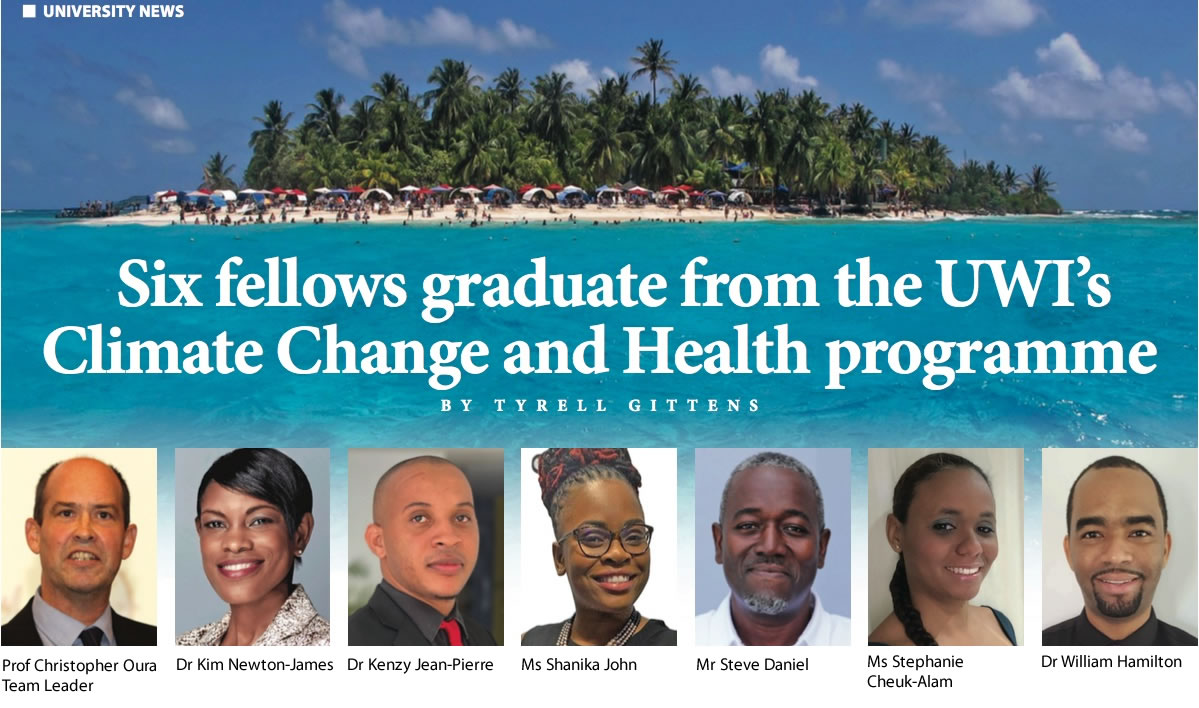
While conversations about the effects of climate change may often focus on rising sea levels, increases in sea surface temperatures and extreme weather patterns, Professor Christopher Oura wants more discourse on how the global phenomenon affects the health of people in the Caribbean and the region’s healthcare systems.
A professor in Veterinary Virology at The UWI’s School of Veterinary Medicine, Oura is the team leader of the university’s recent inaugural Climate Change and Health Leaders Fellowship Programme.
With small island developing states (SIDs) like those in the Caribbean grappling with the effects of climate change and on the frontline of the climate fight, Oura stated that the programme follows through on the university’s commitment to foster greater action to make the Caribbean more climate-resilient by empowering change-makers with a drive to do so.
On May 31, Dr William Hamilton (The Bahamas), Mr Steve Daniel (Barbados), Dr Kim Newton-James (St Lucia), Ms Shanika John (St Vincent and the Grenadines), Ms Stephanie Cheuk-Alam (Suriname) and Dr Kenzy Jean-Pierre (Haiti) became the first cohort of fellows to graduate from the programme during a ceremony at the Trinidad Hilton and Conference Centre in Port-of-Spain.
Oura said each fellow is a working professional in different aspects of their respective country’s healthcare system, and can shape and implement policies to make their populations and systems more climate-resilient.
In bringing the fellows together, the goal is to create a network of working professionals with a common goal of strengthening resilience, guided by a “One Health, One Caribbean” approach which recognises the shared challenges across the region and the intricate interconnections between the health of people, animals, and their shared environment.
He explained, “These fellows are so strong together because they bring in that multidisciplinary factor that is critical when you’re dealing with a complex problem like climate change. When we’re thinking about climate change and health, we’re not just thinking about diseases, but we’re also thinking about all the indirect effects that climate change will have on things like food and water security and safety which are going to affect our health and well-being.”
Coordinated by the Pan American Health Organisation (PAHO) and funded by the European Union, the 12-month part-time fellowship is being led by The UWI in partnership with other supporting organisations including the Caribbean Community Climate Change Centre (CCCCC), The Caribbean Public Health Agency (CARPHA), the Caribbean Institute for Meteorology and Hydrology (CMIH), the Caribbean Disaster Emergency Management Agency (CDEMA), the Windward Islands Research and Education Foundation (WINDREF) and the NGO EarthMedic/EarthNurse.
During the programme, fellows are trained to become agents of change, so they can support their countries to integrate a health component into their national climate change adaptation plan.
Satisfied with their performance, Oura is optimistic that the newly graduated cohort has gained the competencies and skills that are necessary to aid in the development and implementation of climate change and health plans and policies in their countries.
“As we build this fellowship going forward, we will get more fellows trained every year, so we will develop a network of climate change and health leaders with different areas of expertise from across our region working together to lead the process of change both regionally and nationally.
“The UWI is bringing in expertise to support the fellowship from across the whole of the Caribbean and from all of The UWI’s five campuses, very much a One-UWI approach.
But even as The UWI and fellows do their part in strengthening regional climate resiliency, Oura wants people to take personal responsibility and think of ways they can join the fight against climate change.
He urged, “Everyone must think individually of what they can do, because it’s not too late, and we can all do things individually to reduce the impacts.”
Speaking during his graduation, Dr William Hamilton recalled that his drive to become a climate activist was fueled when he witnessed the devastating effects Hurricane Dorian had on the Bahamas in 2019.
A medical physician with the Bahamas’s Department of Public Health, Hamilton explained, “I thought applying for this fellowship would provide me with the knowledge I needed to solidify my experience (as a climate activist). However, I am happy to say that this fellowship has done far more than that. The fellowship has given me a greater appreciation for the interconnectedness of climate change.”
An environmental health specialist with Barbados’s Ministry of Health, Steve Daniel described the programme as an enriching experience.
He said it provided an opportunity for working professionals like himself to establish networks throughout the Caribbean, and ensure there is regional collaboration amongst projects to develop climate resiliency, which can ensure a unified approach to building climate resilience.While navigating the challenges of the COVID-19 pandemic and the 2021 volcanic eruption in St Vincent had Shanika John questioning her abilities to complete the programme, she said she handled the uncertainties with the support of friends, family, peers and the programme’s coordinators.
The programme not only widened her scope as a health promotion officer in the island’s Ministry of Health, but also gave her the opportunity to be promoted to acting Chief Health Promotion Officer.
Addressing the fellows, the EU’s regional manager for environmental projects Jose Legarra said he is optimistic the union’s investment in the project will help build regional climate resiliency.
Legarra said, “The University of the West Indies has once again highlighted that it continues to be an important partner in designing regional programmes that can effectively address regional challenges. We [at the EU] are pleased to support efforts that encourage this approach which is key to sustainable and impactful development.”
The programme’s second cohort of fellows started training in early June while applications for the third cohort will open in November.